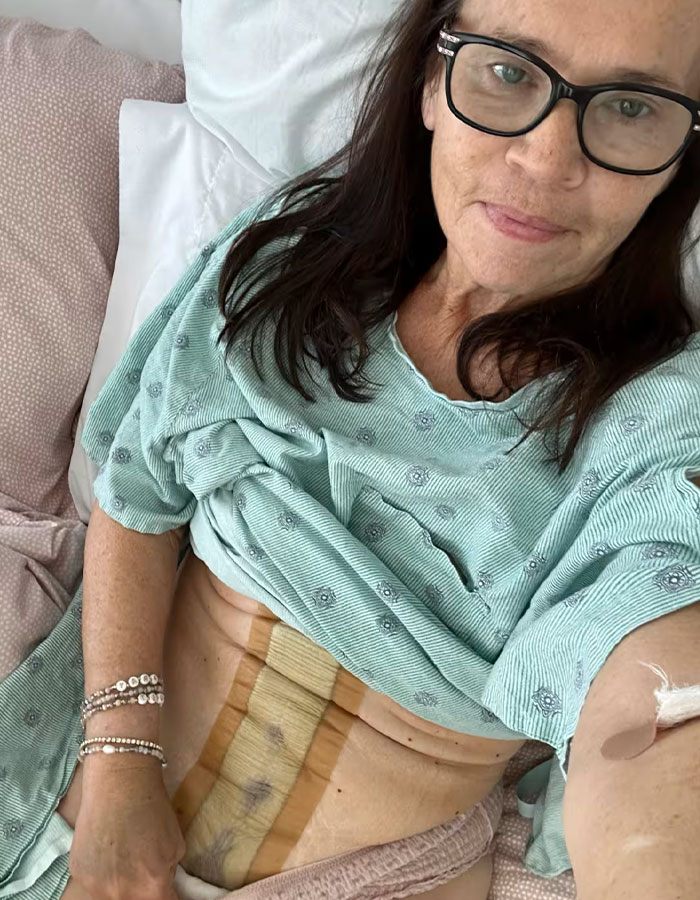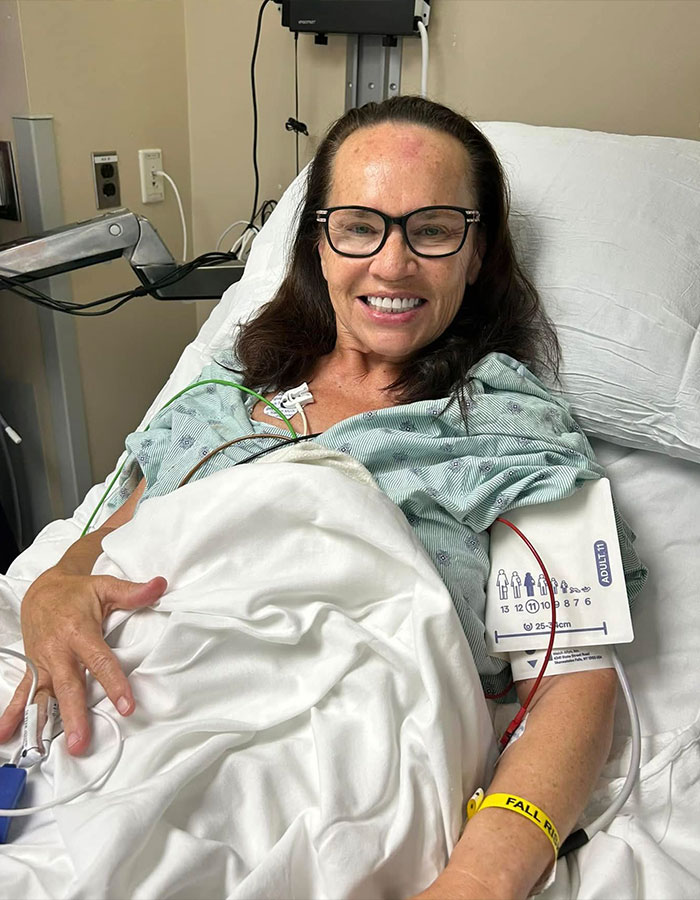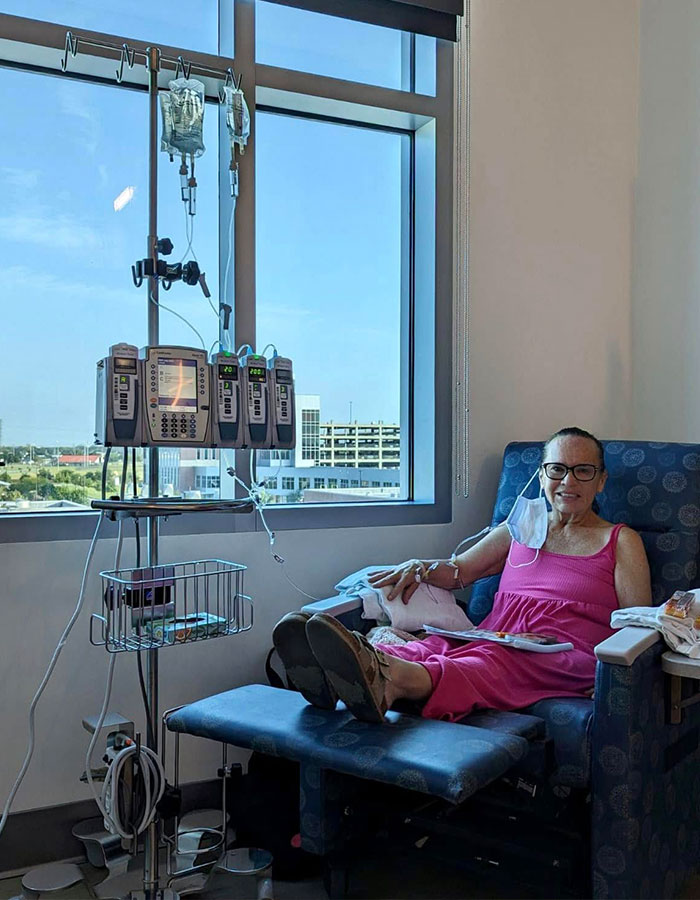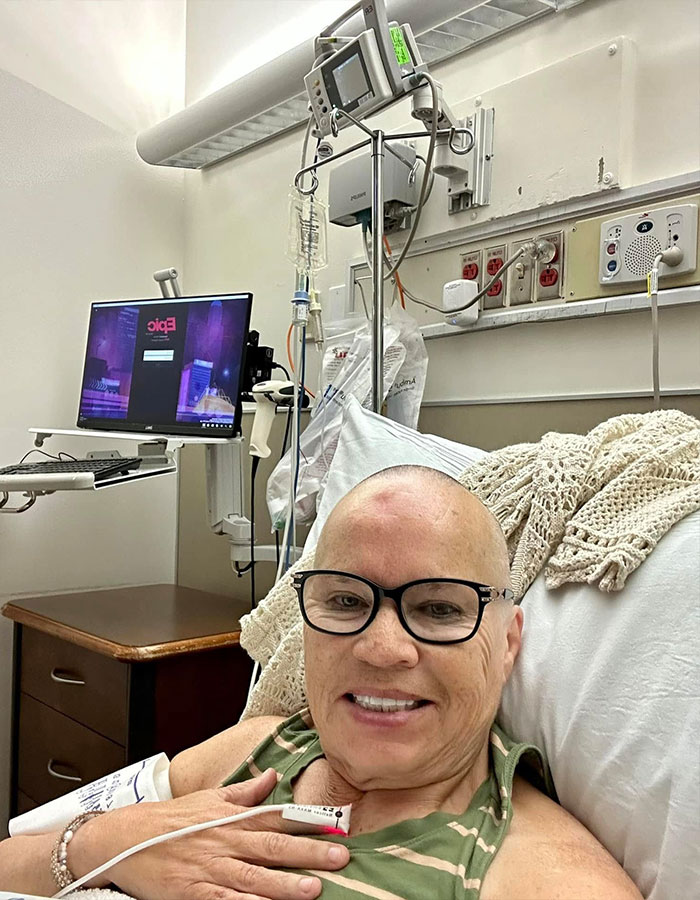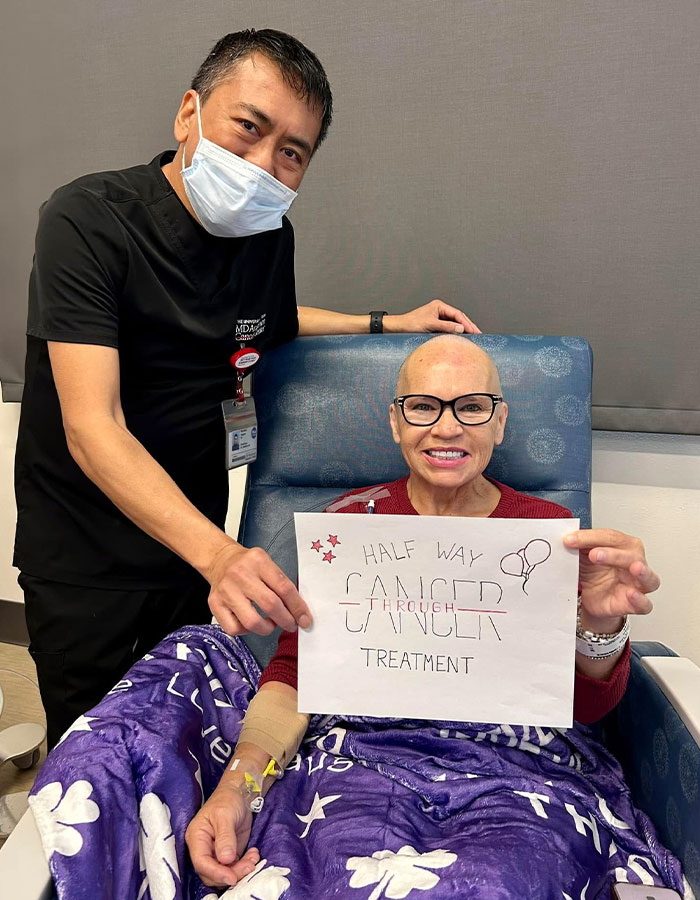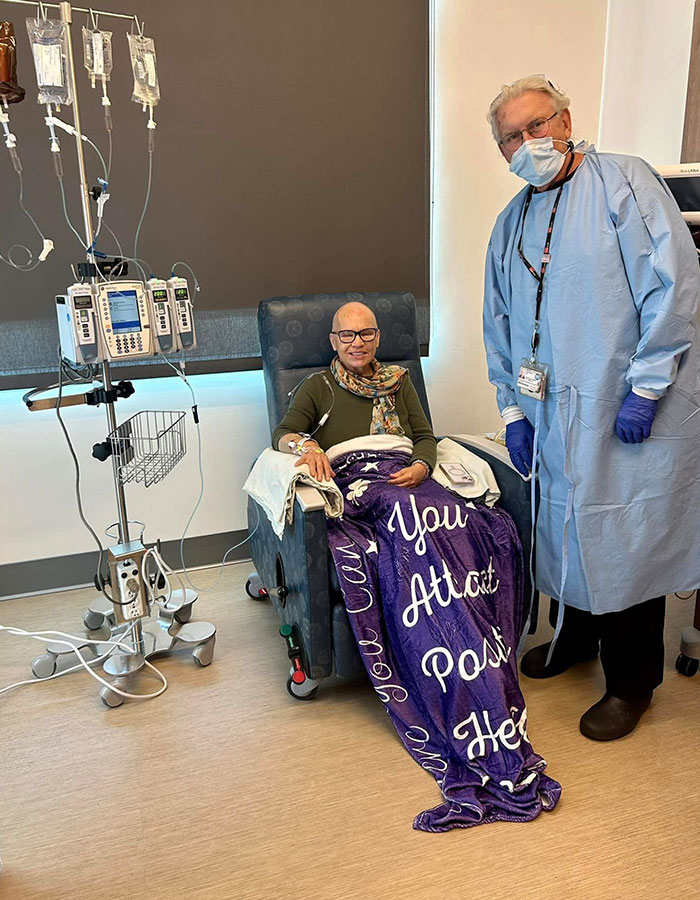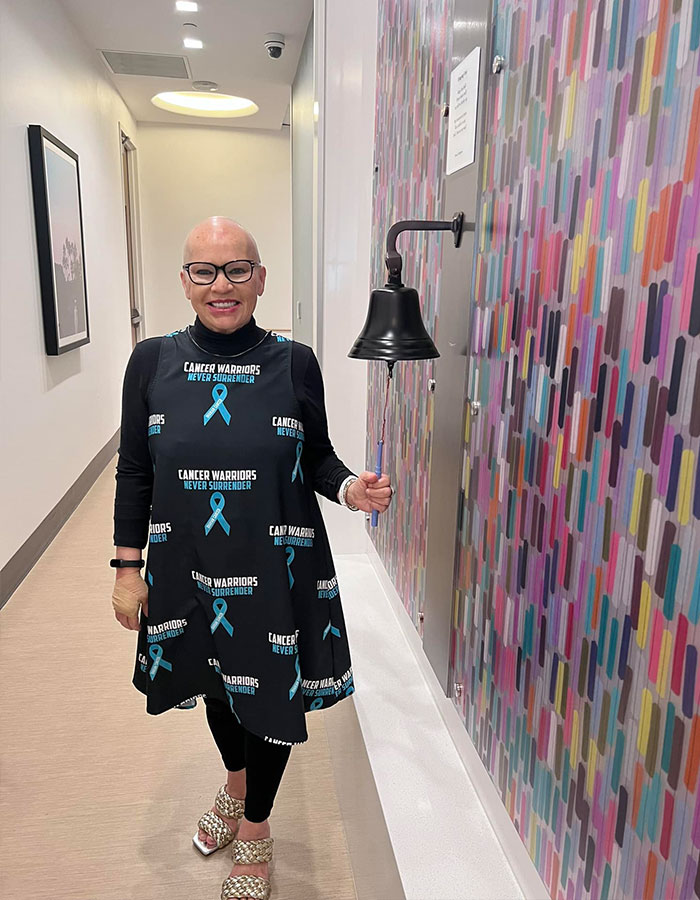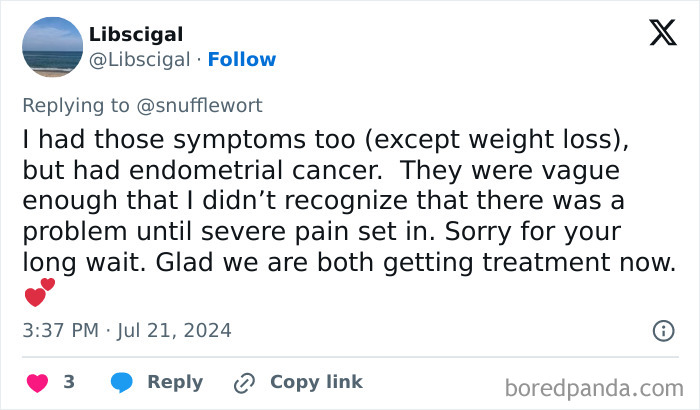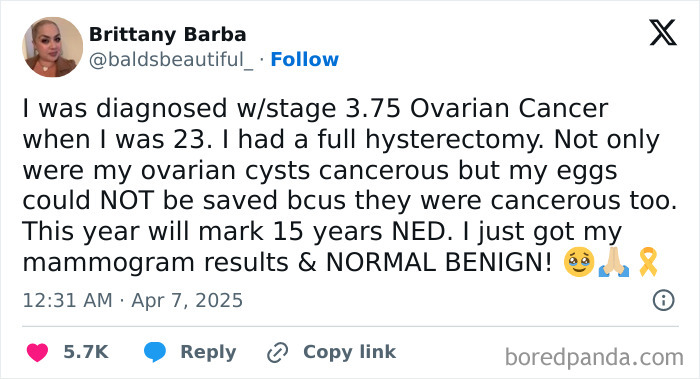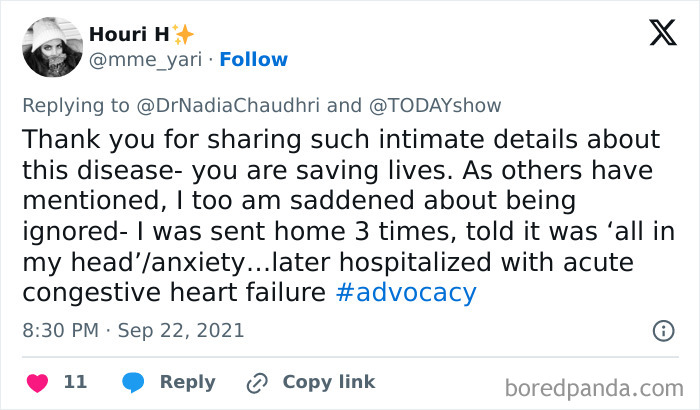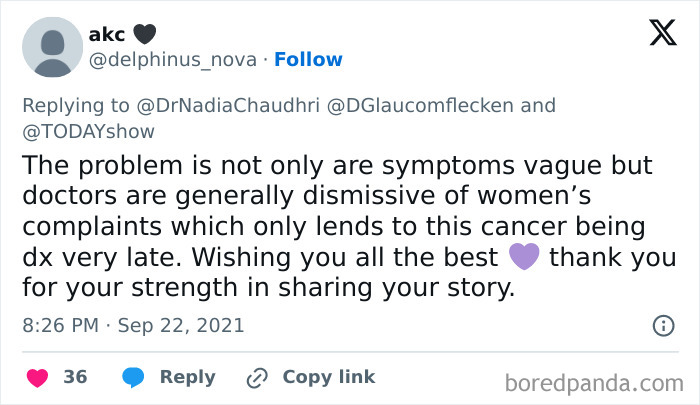Carla Peoples was used to a busy, glamorous life. As a society columnist in Galveston, Texas, she often slipped into sparkling ball gowns to cover galas and charity parties.
She rarely thought about her health, as she had always been “totally healthy.” But in the fall of 2022, her body began sending signals she couldn’t quite explain. Her stomach was growing larger, yet her clothes were slipping loose.
- A woman’s everyday symptoms turned out to be signs of late-stage ovarian cancer.
- Doctors first misdiagnosed her with a prolapsed bladder before an emergency scan revealed tumors.
- Now, she tells Bored Panda her message on what women can take away from her experience.
At first, doctors told her it was nothing more than a bladder issue. The truth, she would later learn in a moment that felt like the world stopped, was far more serious: ovarian cancer.
Ovarian cancer had subtle symptoms, but they were easy to overlook
Image credits: Instagram/Carla Peoples
The changes started gradually. Carla, 67, noticed bloating that just didn’t go away, until her belly stuck out so much that she could place her hand on it like an expectant mother.
“I literally could put my hand on my stomach like you do when you’re pregnant. I (felt) like I’m 10 months pregnant. And I looked it, too, because I’m a small person,” she told TODAY.com.
At the very same time, her evening gowns were slipping off her shoulders. Dresses that once hugged her frame now hung loose, as if she’d been dieting, except she hadn’t.
It was confusing and unsettling, but when she went to a specialist, she was told that it was just a prolapsed bladder. As it turned out, these were already the warning signs of a far more serious condition.
Image credits: Instagram/Carla Peoples
“My belly was big, but I was losing weight. There were two symptoms of ovarian cancer that were just right out there in front of my face. And I didn’t really acknowledge it,” she said.
When Bored Panda asked what first made her feel something was unusual, Carla explained, “Every symptom I had mirrored the symptoms for a prolapse bladder. Especially when I saw a urogynecologist, and this was his diagnosis.”
Medical experts told Bored Panda that this confusion is extremely common.
“Symptoms of ovarian cancer are non-specific and can mimic a variety of conditions such as irritable bowel syndrome, benign ovarian cysts, or even hormonal changes of menopause,” explained Dr. Sharron Manuel, MD, PhD, a gynecologist at HRC Fertility.
Image credits: Instagram/Carla Peoples
“Because the ovaries are positioned deep in the pelvis, ovarian cancer can grow and spread before symptoms become severe enough for patients to seek evaluation.”
Dr. Mabel Lee, MD, also a gynecologist at HRC Fertility, echoed this point: “Many patients believe these issues are menstrual cycle–related or gastrointestinal problems rather than something more serious.”
For Carla, her trust in her original doctor made her feel safe. But just days before the planned procedure, she ended up in the emergency room, and that’s when her life took a dramatic turn.
A CT scan revealed the grim truth about her condition
Image credits: Instagram/Carla Peoples
Doctors immediately ordered a CT scan, and what they discovered left Carla reeling. She didn’t have a bladder problem at all.
Instead, two massive tumors were pressing against her organs: one as large as a football, the other closer to a small watermelon.
“It was such a thunderbolt,” she said. “The world just kind of stopped.”
She was introduced to Dr. Gwyn Richardson, a gynecologic oncologist at MD Anderson, who explained that surgery would determine her future.
Image credits: Instagram/Carla Peoples
If the cancer hadn’t spread too far, doctors could remove the tumors, her ovaries, and uterus. If it had spread, they would have to close her up and begin chemotherapy.
The surgery lasted eight hours. When she woke up, her doctor gave her a thumbs-up. They had been able to perform the full debulking operation.
Carla burst into tears, relieved that the worst hadn’t come true. Her cancer was advanced, but it had not spread beyond her pelvis. Her official diagnosis was Stage 3 high-grade serous ovarian cancer.
Genetic testing later revealed something she never expected. She carried the BRCA1 mutation, a gene that can raise the risk of ovarian cancer, according to the National Cancer Institute.
Image credits: Instagram/Carla Peoples
“That was a shock to me, of course. I’m adopted, but it still was a shock because I had been utterly healthy up until all this happening. I wasn’t expecting that at all,” she said.
Experts say paying attention to the persistence of symptoms is critical. “The key thing to note is the onset and duration of symptoms: it should raise a red flag if symptoms are new, occur frequently, and/or persist for more than a few weeks,” Dr. Lee noted.
Carla advises living with vigilance, and she is urging women to listen to their bodies
Image credits: Instagram/Carla Peoples
Carla’s treatment was grueling. She still endured six rounds of chemotherapy and now takes targeted medication to keep the cancer from returning.
Slowly, she has rebuilt her routines, but she admits she approaches life differently now. “You just go on, you have to, and you’re grateful to go on. The little things don’t bother you anymore,” she said.
Her experience also left her with regrets, ones she hopes other women will learn from. When asked by Bored Panda what she wished she had done sooner, Carla didn’t hesitate.
Image credits: Instagram/Carla Peoples
“I wish I had gone for a second or third opinion. My doctor never asked for a CT scan or anything to see if his diagnosis could be wrong.”
Her advice, shared with Bored Panda, is urgent and heartfelt. “Always look at different possibilities of what might be happening to your body. Don’t put all your trust in a doctor that doesn’t order different tests.
“Pay attention to your body, and different changes. Always ask for a CT scan. Ovarian cancer and other diseases often mimic each other,” she said.
Image credits: Instagram/Carla Peoples
Doctors agree that pushing for evaluation is key.
“An individual noticing these changes that are not normal for them should seek evaluation from their gynecologist who can determine what testing needs completed and if a referral to additional specialists, such as a gynecologic oncologist is warranted,” said Dr. Manuel.
Dr. Lee added that self-tracking can help patients advocate for themselves.
Image credits: Instagram/Carla Peoples
“One way to do so is to keep track of your symptoms by recording them and emphasizing that the symptoms are new and out of the ordinary for you.
“While it is most likely that you will first share your concern with a PCP, it may be beneficial to see a doctor who more frequently deals with cancers and/or the female reproductive system, such as an OB/GYN.”
Netizens shared their thoughts on Carla’s experience on social media
Image credits: eddd218a71aa4e1
Image credits: zoeatkinson2301
Image credits: teacherjamie1
Image credits: dlennard
Image credits: Janet86659076
Image credits: sam_lucy
Image credits: YingHuiThe
Image credits: Sevillana8
Image credits: Libscigal
Image credits: baldsbeautiful_
Image credits: mme_yari
Image credits: delphinus_nova
Thanks! Check out the results:
Total votes ·

